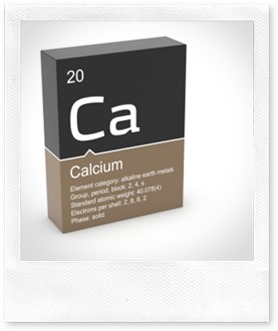 A great deal of confusion has been stirred up in the last few months about the potential harm of too much calcium intake. As is often the case, there are studies that reveal conflicting results.
A great deal of confusion has been stirred up in the last few months about the potential harm of too much calcium intake. As is often the case, there are studies that reveal conflicting results.
Examples of this include the following summaries:
1) Calcium from food does not appear to raise the risk of cardiovascular disease and observational data suggests that it may lower risk.
Wang L, et al. Calcium intake and risk of cardiovascular disease: A review of prospective studies and randomized clinical trials. Am J Cardiovasc Drugs 2012;April 1; 12:105
2) Hypothetically, calcium supplements may raise blood calcium levels more rapidly than does dietary calcium, and therefore may increase risk for cardiovascular disease. This remains unproven.
Manson J, Bassuk S. Calcium supplements: Do they help or harm? North American Menopause Society Practice Pearl September 6, 2012
3) In the Women’s Health Initiative (WHI), there was no overall increase in myocardial infarction (MI) or stroke, but there was a 22% increase in MI risk in women who first began taking calcium supplements at the beginning of the trial but not in those who already were taking them at baseline.
Bolland M, et al. Calcium supplements with or without vitamin D and risk of cardiovascular events: Reanalysis of the Women’s’ Health Initiative limited access dataset and meta-analysis. BMJ 2011 Apr 19;342:d2040
4) At the end of the WHI, calcium supplements did not increase coronary artery calcification.
Manson J, et al. Calcium/vitamin D supplementation and coronary artery calcification in the Women’s’ Health Initiative. Menopause 2010; Jul; 17:683.
5) A review of randomized trials have shown that compared with placebo, calcium supplements, with or without vitamin D, were not linked to cardiovascular disease risk.
Wang L, et al. Calcium intake and risk of cardiovascular disease: A review of prospective studies and randomized clinical trials. Am J Cardiovasc Drugs 2012;April 1; 12:105
Two recent population based studies in 2013 now suggest that high calcium intake is associated with greater risk of cardiovascular mortality and all cause mortality. (One demonstrated this in men and not in women) However, it appears as though that women with the highest dietary intake
(> 1,400 mg/day) had greater all-cause mortality and mortality from cardiovascular disease (but not stroke). This occurred in only those women who were already consuming > 1,400 mg/day in their diet and in addition, taking a calcium supplement above and beyond the 1,400 mg dietary source. Intake of calcium in tablet form > 1,400 mg/day was associated with 2.5 times greater risk of death from all causes. This means, that if the total of calcium exceeds 1,400mg/day, cardiovascular harm can occur. Calcium dietary intakes of 600-1,000 mg/day were the lowest risk.
Michaelsson K, Melhus, H, Lemming E, et al. Long term calcium intake and rates of all cause and cardiovascular mortality: community based prospective longitudinal cohort study. BMJ 2013; 346
Xiao Q, Murphy R, Houston D, et al. Dietary and supplemental calcium intake and cardiovascular disease mortality: The national institutes of health- AARP diet and health study. JAMA Intern Med 2013: 1-8
6) The U.S. Preventive Services Task Force updated guidelines in February 2013 regarding the benefits and harms of combined vitamin D and calcium supplements for the primary prevention of fractures in postmenopausal women or men. They stated “current evidence is insufficient to assess the balance of the benefits and harms of combined vitamin D and calcium supplements for the primary prevention of fractures in postmenopausal women or men.” They also stated that there is no evidence to support use of more than 1,000 mg of calcium and 400 IU of vitamin D per day and recommends using lower doses except in women who have osteoporosis or vitamin D deficiency. As you can see, this is quite different than other recommendations— thus the controversy and confusion.
USPSTF 2013 update
· The USPSTF concludes that the current evidence is insufficient to assess the balance of the benefits and harms of combined vitamin D and calcium supplementation for the primary prevention of fractures in premenopausal women or in men.
· The USPSTF concludes that the current evidence is insufficient to assess the balance of the benefits and harms of daily supplementation with greater than 400 IU of vitamin D3 and greater than 1,000 mg of calcium for the primary prevention of fractures in noninstitutionalized postmenopausal women.
· The USPSTF recommends against daily supplementation with 400 IU or less of vitamin D3 and 1,000 mg or less of calcium for the primary prevention of fractures in noninstitutionalized postmenopausal women.
Is there another problem???
1) What about magnesium?
Higher calcium intakes decrease tissue levels of magnesium and some studies but not all show that higher calcium dosing leads to decreased magnesium absorption and plasma magnesium levels. It is possible that in the higher range intakes of calcium, a greater need for magnesium may be required and if this is not met, then in essence a magnesium insufficiency may occur. Low magnesium levels are associated with high C-reactive protein and metabolic syndrome. In the Nurses Health Study, there was an association between lower magnesium intake and death from coronary heart disease.
Chiuve S, Sun Q, Curhand G, et al. Dietary and plasma magnesium and risk of coronary heart disease among women. J Am Heart Assoc. 2013;2(2)
My current advice:
Estimate daily intake (good charts are available, for example – calcium rich foods: National Osteoporosis Foundation = http://www.nof.org/)
Totals of diet plus supplementation should be approximately 1,000 mg/day if < 50 woman
Totals of diet plus supplementation should be 1,000 mg-1,200 mg/day and not exceed 1,400 mg/day if > 50 y.o. woman
Total diet plus supplementation should not exceed 1,400 mg/day
Optimal supplemental calcium intake should include supplemental magnesium

